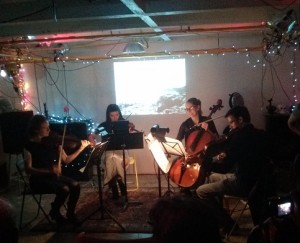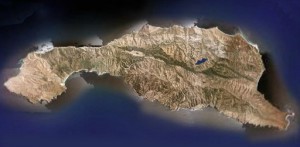A Night of Microtonal Music at Betalevel in Los Angeles
 On Thursday November 7, Betalevel, that famously obscure underground venue in Chinatown, hosted a concert of microtonal music entitled The Things That Overpower Us. The program featured the music of Kraig Grady, in Los Angeles for the week and who brought his personal greetings from the metaphorical Island of Anaphoria. A standing-room only crowd of about 50 jammed into the small space to hear performances by Tangerine Music Lab and a string quartet consisting of Melinda Rice, Mona Tian, Andrew McIntosh and Ashley Walters.
On Thursday November 7, Betalevel, that famously obscure underground venue in Chinatown, hosted a concert of microtonal music entitled The Things That Overpower Us. The program featured the music of Kraig Grady, in Los Angeles for the week and who brought his personal greetings from the metaphorical Island of Anaphoria. A standing-room only crowd of about 50 jammed into the small space to hear performances by Tangerine Music Lab and a string quartet consisting of Melinda Rice, Mona Tian, Andrew McIntosh and Ashley Walters.
The concert began with an extended improvisation by Tangerine Music Labs that was loosely based on a series of selected individual words: Fire, Ginger, Lanterns, etc and short phrases such as The Hawk Cries and Return. The piece began with a series of slow, steady chords by Ryan Tanaka on keyboard and this was soon joined by warm sounds from the viola, played by Deanna Lynn. The smooth, languid feel from the flute-like registration of the keyboard was complimented at times by counterpoint in the viola but there were never any sharp edges. The words selected were sung by vocalist Emily Loynachan in simple, declaratory passages of just a few notes, playing off the other two instruments with a fine sense of timing. The blend and balance here were excellent and the piece flowed agreeably to a quiet conclusion.
This was followed by a string quartet composed by Melinda Rice based on familiar American folk songs surrounded by sounds produced by extended string techniques. The piece began with soft, small, airy sounds that were soon in the company of a traditional folk tune played strongly in the violin. The effect was something like coming out from a long walk in the woods into a sudden clearing and seeing a house, with smoke curling from its chimney. The piece proceeded in this fashion – the folk tunes, and then mouse or perhaps bird-like sounds from the extended techniques. Sometimes the folk tune would be carried by a single instrument, other times in full four-part harmony, but these were separated by sounds that evoked nature. This was a very effective structure – the traditional tunes provided an anchor of familiarity while between these were the more imaginative sounds. Given the Scots-Irish flavor of the folk tunes, it conjured a convincing portrait of an early America that was thinly settled and predominantly wilderness.
Kraig Grady’s solo violin piece was next, a tribute to Lou Harrison. This proceeded in a series of strong, marcato passages, often syncopated. A photo of an antique telegrapher’s key was projected on the wall behind the performer and the work included a series of Morse code passages that were embedded in the rhythms. A long time ago I was able to read Morse code but I confess I couldn’t detect anything of the familiar patterns here – but the effect was certainly present.
 Mica followed, a string quartet written by Terumi Narushima, who teaches at the University of Wollongong and is also married to Kraig Grady. Ms. Narushima explained that Mica was inspired by the sheen of the granite buildings in a big city, the mineral mica being the constituent of granite that gives off the brightest reflections. The piece begins with a series of slow, gentle chords that build in volume and then subside, reminiscent of an ocean swell on a lazy summer day. The microtonal technique here was nicely done and a feeling of a soft warmth was effectively realized. A Google Earth view of Anaphoria was projected on the wall and its state of seeming serenity was entirely appropriate. As the piece proceeded, a sharpness and intensity emerged that put one more in mind of the hard glint of sunlight reflecting off a granite skyscraper. The effective use of dynamics and skillful selections from the palette of pitches made hearing this piece a delightful experience.
Mica followed, a string quartet written by Terumi Narushima, who teaches at the University of Wollongong and is also married to Kraig Grady. Ms. Narushima explained that Mica was inspired by the sheen of the granite buildings in a big city, the mineral mica being the constituent of granite that gives off the brightest reflections. The piece begins with a series of slow, gentle chords that build in volume and then subside, reminiscent of an ocean swell on a lazy summer day. The microtonal technique here was nicely done and a feeling of a soft warmth was effectively realized. A Google Earth view of Anaphoria was projected on the wall and its state of seeming serenity was entirely appropriate. As the piece proceeded, a sharpness and intensity emerged that put one more in mind of the hard glint of sunlight reflecting off a granite skyscraper. The effective use of dynamics and skillful selections from the palette of pitches made hearing this piece a delightful experience.
The final piece in the program was Poole’s Lament by Kraig Grady, “a tribute to Grady’s colleague Rod Poole who was working on an arrangement of a set of Irish tunes before his tragic death.” This was performed by the string quartet. Poole’s Lament is based on a setting of an Irish reel and the piece begins with the tune resolutely played in standard tuning. Trills creep in to cover the main theme and the piece gradually unpacks into a series of long tones and quiet chords. Microtonal passages further enhance the sense of an unwinding process. In his comments prior to the playing of this work, Kraig Grady described the piece as following the arc of the natural processes that occur in the repose of death. This was not portrayed as morbid or unseemly in the music, but rather as a gentle disassembly into eternity. Soft tones and quiet pizzicato notes concluded this sweetly elegant commemoration.
 By way of encore, the string quartet was asked to improvise – as a group – on a series of placards held up by Kraig Grady. The words on these signs triggered all manner of interesting responses from the musicians, and proved to be very entertaining. This speaks to the high level of musicianship provided by Melinda Rice, Mona Tian, Andrew McIntosh and Ashley Walters. The excellent playing, enthusiastic audience and the company of the composers made The Things That Overpower Us a memorable evening of new music.
By way of encore, the string quartet was asked to improvise – as a group – on a series of placards held up by Kraig Grady. The words on these signs triggered all manner of interesting responses from the musicians, and proved to be very entertaining. This speaks to the high level of musicianship provided by Melinda Rice, Mona Tian, Andrew McIntosh and Ashley Walters. The excellent playing, enthusiastic audience and the company of the composers made The Things That Overpower Us a memorable evening of new music.